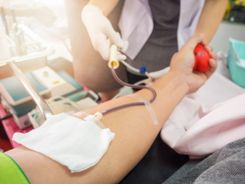Support Blood Cancer Awareness Month This September

In 2018, more than 170,000 people will be diagnosed with a type of blood cancer. September is Blood Cancer Awareness month, which was designated by the U.S. Congress to raise awareness of the disease and encourage philanthropy for blood cancer research. Here’s what you should know.
What Is Blood Cancer?
Types of blood cancer include leukemia, lymphoma, myeloma, myelodysplastic syndromes, and myeloproliferative neoplasms. They are the third leading cause deaths from cancer in the U.S. The survival rate for people with blood cancer depends on the type of cancer they have, with myeloma having the lowest five-year survival rate, and Hodgkin lymphoma having the highest.
Well-funded research is vital to improving the survival rate for cancer patients. Thanks to research that has helped produce more effective treatments, the five-year survival rate for patients with leukemia has risen from 34% in the mid- to late-1970s to nearly 64% from 2006–2013.
How Can You Participate in Blood Cancer Awareness Month?
 Orange is the color chosen to represent blood cancer. If you want to show your support and help raise awareness, you can wear orange or request a bag of orange ribbons from the Leukemia Research Foundation. You can also tweet and post to social media using #LRFHeroes and #HeroesWearOrange. If you want to go beyond awareness, you can make a financial donation to the Leukemia Research Foundation or to the Red Cross, which provides blood and platelets to patients with blood cancer.
Orange is the color chosen to represent blood cancer. If you want to show your support and help raise awareness, you can wear orange or request a bag of orange ribbons from the Leukemia Research Foundation. You can also tweet and post to social media using #LRFHeroes and #HeroesWearOrange. If you want to go beyond awareness, you can make a financial donation to the Leukemia Research Foundation or to the Red Cross, which provides blood and platelets to patients with blood cancer.
If you’re unable to donate funding, consider finding a Red Cross blood drive and making an appointment to give platelets or whole blood. These types of blood donations are most useful to cancer patients who lose blood during surgical procedures and frequently need platelet transfusions.
Alaska Oncology and Hematology, LLC in Anchorage, AK, is your partner in the fight against cancer. Their oncology team has the expertise to deliver the latest cancer treatment and the compassion to support you and your family every step of the way. They offer personalized care, access to clinical trials, and resources like support groups. Call (907) 279-3155 to schedule an appointment, and visit them online to learn more about their services.
About the Business
Have a question? Ask the experts!
Send your question

